#dialectic thinking
Explore tagged Tumblr posts
Text
Voyage of Discovery: Hegel and his philosophical work [Part II] “One cannot speak of an injustice of nature in the unequal distribution of possessions and resources, for nature is not free and is therefore neither just nor unjust.”
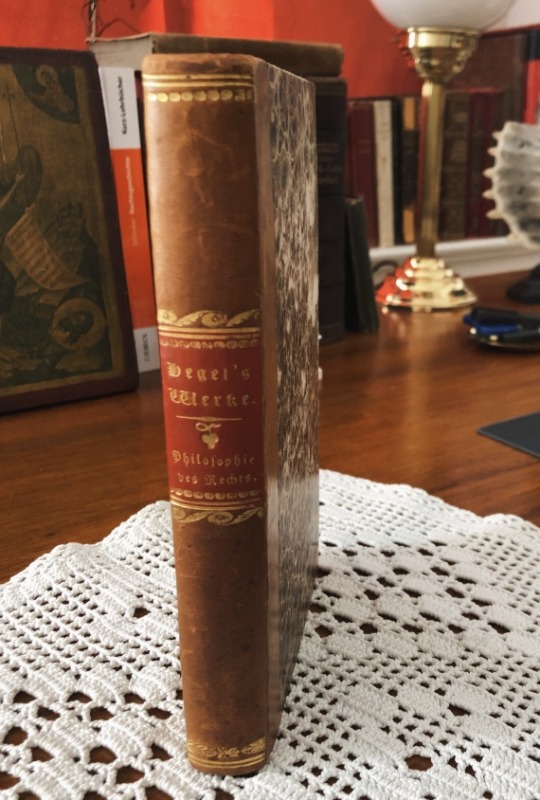
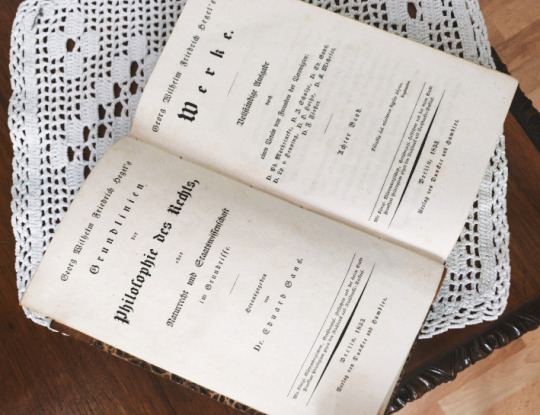
Georg Wilhelm Friedrich Hegel (1770 - 1831) published „Grundlinien der Philosophie des Rechts. Naturrecht und Staatswissenschaft im Grundrisse“ in 1821. In the preface he describes the idea of justice, the term of right and it's realization. The concepts of free will and freedom are interlinked to underline the theory, that the free will can only realize itself in a (reasonable) legal system. Hegel defines “right” [Recht] as the existence of the free will in the world (PR §29). So a philosophy of right is necessarily a philosophy of freedom that seeks to comprehend freedom actualized in how we relate to each other and construct social and political institutions.
“Once the state has been founded, there can no longer be any heroes. They come on the scene only in uncivilized conditions.”

During the last few years I have repeatedly come across Hegel and his dialectics. In the philosophy class we dealt with his dialectics in order to better comprehend Marx's understanding of history and historical materialism. To quote Lenin: "It is impossible completely to understand Marx's Capital, and especially its first chapter, without having thoroughly studied and understood the whole of Hegel's Logic." However, their approaches differ in certain respects, especially in their differing versions of the relation between consciousness and life. While Hegel formulates, that consciousness determines life, Marx, on the contrary, states "(...) life determines consciousness". So this is not only a central question of cognitive ability from an ontological point of view, but to truly understand the hierarchical opposition or relation of consciousness to the human being, vice versa. When I was devouring Schopenhauer three years ago, I often thought of Hegel, who was giving his lectures at the same time, which were attended far more frequently. When I was dealing with the biography of the poet Hölderlin, I found out that Hegel, Schelling and Hölderlin shared a room in the Tübinger Stift. Imaging how these three high spirits inspired and strengthened each other. During my studies I encountered Hegel again in the philosophy of law and in criminal law. The spark jumped with the statement, that the criminal must be be honoured as a reasonable man, because
„Denn in seiner [des Verbrechers] als eines Vernünftigen Handlung liegt, daß sie etwas Allgemeines, daß durch sie ein Gesetz aufgestellt ist, das er in ihr für sich anerkannt hat, unter welches er also als unter sein Recht subsumiert werden darf." In brief: The "reasonable" criminal is breaking a rule, but at the same time, he is forming a new, possible right.
„Daß die Strafe darin als sein eigenes Recht enthaltend angesehen wird, darin wird der Verbrecher als Vernünftiges geehrt. – Diese Ehre wird ihm nicht zuteil, wenn aus seiner Tat selbst nicht der Begriff und der Maßstab seiner Strafe genommen wird; – ebensowenig auch, wenn er nur als schädliches Tier betrachtet wird, das unschädlich zu machen sei, oder in den Zwecken der Abschreckung und Besserung.“ Speaking of crime as an "evil" and punishment as a form of compensating "evil" falls too short and tempts to focus too much on the intention of the criminal and thus leads to "recharge" the punishment morally and psychologically, which has no fruitful function. Again for better understanding:
It is not the criminal who can question the law, but only Society that recognizes infringement as a new right. It therefore requires one clarification that the (new) law set by the criminal does not apply if it should not be recognised. Penal Theories are deffining penalty purposes, aspects of justice (cf. ius talionis "an eye for an eye, a tooth for a tooth") and are also considering the soundness of mind and how crimes can be prevented. Hegel was a representative of Absolute Penal Theories like Kant, both advocated death penalty [!] and the central aspect "restoring justice", could not explain, why penalty is needed. Also the Absolute Penal Theory is forbidding considerations of utility and meaning of the punishment (e.g. therapeutic offers), explaining this view with incompatible with the "dignity and freedom of men". Continues in the second part.



#philosophy#epistemology#ontology#dialectic thinking#dialectic method#Hegelian dialectic#georg wilhelm friedrich hegel#Hegel#antiquarian book#19th century literature#reading
6 notes
·
View notes
Text
i notice that i and many people in my area tend to omit the "to be" in phrases like "the cats need to be fed" and "your kid wants to be held" but i don't thiiink it's standard english and i'm curious if it is a regionalism or what
bonus: say what you voted and add what general region you're from/what dialect of english you speak (if you feel comfortable doing so)
#eliot posts#linguistics#polls#i do it on some occasions when i'm being more casual and my dialect is like pittsburgh area/north appalachian#was talking abt this w my friend (from mexico) last night#they said they think they've mostly just heard it from me. and maybe also from the mcelroys#which would track if so bc the mcelroys are from west virginia which is close to where i grew up#probably a little bias here towards ''i heard others do it'' cuz well. yinz are following me who does that#also cuz im a taz fan so many of yinz are too and would have heard the mcelroys do it (if my friend is remembering correct that they do it)
4K notes
·
View notes
Text
And one amang, an Iyrysch man,
Uppone his hoby swyftly ran…

WAIT HANG ON - slamming the brakes on drawing this stupid picture - do you nerds even KNOW the etymology of the word “hobby”? The thing you do for pleasure? The thing you have too many of? The thing you spend too much money on and share with your friends? The thing tumblr probably is to you? Those hobbies?
It comes from a now-kind-of-extinct breed of Irish pony-horse. It was called the Irish Hobby. Supposedly the hobby got its name from the Gaelic word obann, or swift. They definitely were. They’d obann your pants clean off.
Fast tough little bastards, built for rough terrain and renowned for their speed and stamina, hobby horses belonged to the Celts, and their highly annoying style of mounted warfare. but their conquerors liked hobby horses a lot, kept them, used them for themselves, and found them useful enough, despite the fact that they also had famously useful things like mounted knights or horse archers. A lightweight Irish warrior, mounted on a hobby horse, was called a hobelar.
Reportedly and in depictions, hobelars rode without stirrups. Or saddles. Or bridles. Or - well - this is all sounding very improbable, because the hobelars COULDNT have just been charging around basically bare-assed on naked ponies, screaming, and somehow in the process undoing the composure of actual mounted armoured knights. Knights who, I remind you, had stirrups. Stirrups are useful! It’s quite likely the hobelars had some gear. And clothes. and weapons. And the ponies probably had some tack - I am picturing a bellyband that you could at least hang a saddlebag on, and a neck rope for catching the bloody thing, even if not a saddle. But the overall impression, somehow created by people on darling little ponies, was apparently quite striking and fearful.
I mean. God Forbid People Have Hobbies.
Anyway after a while, whatever people became the British had eventually conquered all of the rough terrain that hobbies were best at, and horse archers just got sexier, and mounted knights became aristos, and all the bog and forest people had been subdued, so it was time to sunset the hobelars. but WAIT! Hobby horses are still tremendously fun and appealing! They’re so fast! and you can ride them without a saddle! Sure, they’re not up to the weight of a mounted knight, or indeed a lot of guys… but surely we can still find a use for a hobby or two? In the back garden? Somewhere?
At which point an English king decided to keep hobby horses just for fun. No military application. No further development of the technology. Not for fun. Just as expensive, pleasurable, pets. Just for the joy of the thing.
And that is how hobby (activity done purely for pleasure) comes from hobby horse (small horse) possibly from obann (swift.) they’re very interesting and you should look all this up for yourself! because it sure sounds like Elodie doing a bit, doesn’t it?
Today, Irish Hobbies are functionally nonexistent. References for drawing include the Kerry Bog Pony, the Connemara, and (I personally think) Dartmoors and Exmoors. They’re said to have lent their speed to the Irish Hunter/Sport Horse and from there to the Thoroughbred, but every damn horse in the world claims relation to the Thoroughbred, and they can’t be THAT thoroughly bred.
At any rate - you can never have enough hobbies. Just be glad that yours aren’t expensive beasts with minds of their own, eating their heads off in the pasture! …Unless they are. In which case, you’re part of a proud tradition.
#Killie#this is Killie’s ancestor who occasionally turns up in hallucinations with various ghost horses#like all elements of magical realism in the killieverse he does absolutely NOTHING useful.#your ancestor is neither proud of you nor disappointed in you. he’s riding alongside explaining some thoughts he had at breakfast#performing weird fuckin feats of equitation outside the window while you’re trying to sit through school or waiting in the queue at Greggs#if you wake up in a hospital bed in a bleary moment before consciousness he’s perched next to you chattering complete fucking nonsense#about. like. the stupidest stuff. like he’s just free-associating his thoughts based on a pattern in the ceiling tiles. incredibly annoying#his dialect just close enough to Irish that you can pick out a few words here and there#enough to tell that it’s complete nonsense. but also he’ll just say things like BASED. (possibly he is also visiting miles?)#and occasionally he points out that he did everything you do in your job but barefoot. no stirrups. in the snow. uphill both ways.#which is quite hard to do in a bog since they’re notably quite distinctively flat usually so sometimes he’d have to find a hill and ride up#and down it a few times just to build character. no saddle no bridle no shoes and the Romans were there maybe - and when you object to that#thinking there seems to be a lot of collision of timelines and historical accuracy - he doesn’t speak Irish suddenly . and why would he.#anyway he doesn’t exist and never did. but he’s fun#occasionally turns up to ride alongside you in a race apparently just to prove he can keep up with modern breeds#usually he can surprisingly well but tbf his horse is a ghost. and when he can’t he says well. I’m not a professional like you.#this. is just my hobby. ahahahahahahahahahshahahahahasha#and with that I get back on my hobby horse and ride away
1K notes
·
View notes
Text
BABA IS AMUSED
BABA IS LANGUAGE
ANON IS SPEAK
#baba is you#post is queue#post is new#ya'll dont NEED to send asks in the baba dialect. its really funny to me how everyone just IMMEDIATELY adopted it.#you guys keep asking if i ever talk or think in the baba dialect irl but i think YA'LL are probably more prone to it than i am!
479 notes
·
View notes
Text
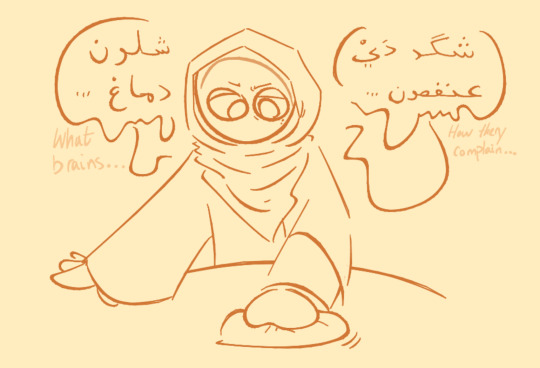
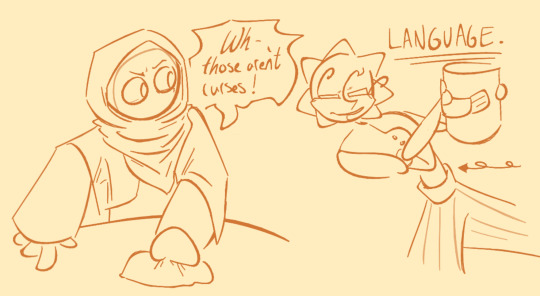
was thinking about how the dca would be able to figure out what counts as a curse in different languages
because on one hand, certain words when directly translated can technically mean a curse…even though they aren’t used the same way in the dialect…but there are also phrases that are very insulting in arabic that lose meaning in translation
so either the dca knows all the informal dialects of any language in their databanks…or they only know the formal ones and it just completely flies over their heads…
(For context, the word عنفص used above is used in the context of complaining or being annoyingly insistent...but it's also used to describe a donkey...)
#minute doodles#minute sona#my sona#fnaf sun#fnaf sundrop#sundrop fnaf#fnaf dca#dca fandom#dca sun#fnaf dca fandom#fnaf dca sun#fnaf#dca art#not supposed to really use that word in polite company but#yea....#I think it's a little funny because the dialect we speak is technically the closest to formal arabic#and all of the insults we come up with are incredibly creative#like english curses are weak one-word punches#our one word punches can throw someone across a city and through a 2 story building#pfft#fnaf daycare attendant#dca fnaf#(this doodle is almost 4 months old now so no judgement please)
267 notes
·
View notes
Text
you know how different parts of japan have their own little dialects and slang? i can totally imagine satoru teaching you japanese — patient and a little smug. he is definitely enjoying being your personal sensei. but along the way, you stray from his teachings and start picking up random words from people all over as well. like from some sweet old lady down the street or a cashier at the store. then one day, in the middle of chatting, you casually drop one of the words, hoping to impress him with your new findings. but satoru just stops, lips parted, staring at you in awe like you’re some foreign species of alien before losing it and tossing his head back in genuine laughter — bc he certainly wasn’t expecting that.
#— the honored one#he’ll tease you about it too bc it’s so funny to him#will start using that word just to see you fluster#he’s wondering where you learned it from too#this is extremely self ship coded#satoao𑁤#he thinks i’m so multilingual and sexy 🙂↕️#finds it so charming i’m just so chaotic#growing up for some reason i spoke a combo of two or three dialects of my language#and i confuse people in conversations and got made fun of#my friends who were especially good at the language say that my way of speaking it is so messy bc of it LMFAO#so i am highly positive the same thing would happen if i tried learning japanese aha
172 notes
·
View notes
Text


#HEHEHE THEY'RE SO CUTE I LOVE THEMMM#such a shame these scenes are so brief 😭#avatar#avatar 2#the way of water#sully family#jake sully#neytiri#neteyam#kiri#lo'ak#jeytiri#lì'fya leNa'vi#gif#i'm actually not sure whether Jake is meant to be saying “sloa tsyal” (wide wing) or “slotsyal” (stormglider) here#but i thiiiiiink i hear the -a sound in there#i mean i suppose it doesn't REALLY matter; either one would make sense in this context#and the species name “slotsyal” derives from “sloa tsyal” anyways (as I'm sure you could've guessed hrh)#(btw “syu” is not a real word; just the closest I could come to the “whoosh” sound effect he's making with Forest dialect phonetics hrh)#it sounds like he also says something else before Neytiri says “hufwe” but I can't make out what it's supposed to be#cuz the voiceover narration is talking over it -_-;#in the next shot when Neytiri is running around she also says something#sounds like it might be “tysal latsu” meaning roughly “must be a wing”#or perhaps “tsyal atun” meaning “red/orange wing” which would make sense with Kiri's little Toruk toy#but I think there's an S sound in there so idk#again it's hard to tell because the narration is playing over it#SHUT UP NARRATION JAKE I'M TRYING TO HEAR WHAT'S HAPPENING IN THE SCENE 😭#oh well
337 notes
·
View notes
Text
Voyage of Discovery: Hegel and his philosophical work [Part II]



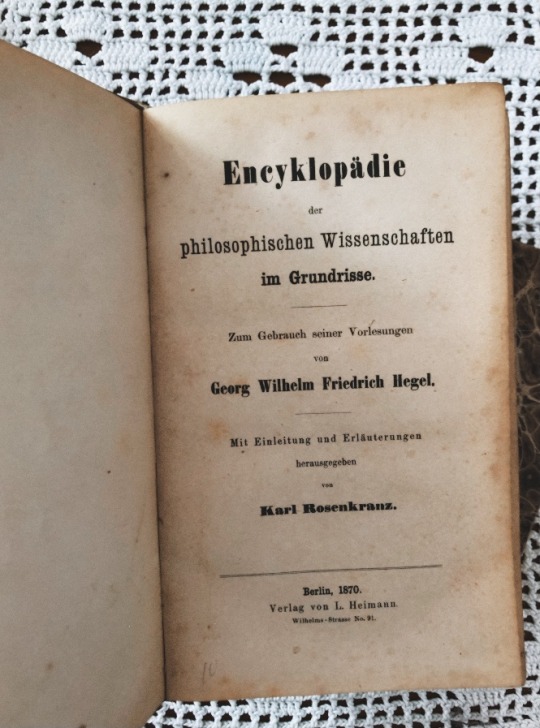
Depicted are Ernst Bloch's interpretation of Hegel's dialectic "Objekt - Subjekt" (1951) and Hegel's "Encyclopaedia of the Philosophical Sciences", originally published 1817, this version if from 1870.
"Nature is, in itself a living whole. The movement of its idea through its sequence of stages is more precisely this: the idea posits itself as that which it is in itself; or, what is the same thing, it goes into itself out of that immediacy and externality which is death in order to go into itself; yet further, it suspends this determinacy of the idea, in which it is only life, and becomes spirit, which is its truth." [Encyclopaedia of the Philosophical Sciences: The Philosophy of Nature, §195]
Similar to Marx, I came into contact with Hegel during my studies and I couldn't avoid delving deeper into his works, so I got myself a good guide and interpreter to start with, namely the work of Bloch. Bloch does not claim to write a book about Hegel "rather one about him, with him, through him." Mentioning the problem of access, Bloch was also aware of this and devoted himself extensively to Hegel's artificial language in the first part. Is it an unnecessary complication or does it serve a systematic purpose?

It is striking that Hegel uses certain words differently. The word predicate, for example, has a special meaning in Hegel's philosophy. It refers to the properties or characteristics that can be attributed to an object. Hegel uses the word predicate in his logic to describe the relationship between a subject and its properties. Bloch states: "The reader must familiarize himself with the objective contradiction in all things that Hegel's conceptual language incessantly reflects." Similiar to Christian Wolff and Thomasius, Hegel wanted "to teach philosophy the German language" and some of his terms (Weltgeist, Zeitgeist, ...) are regularly integrated into philosophical systems. The basic ideas of Hegel's philosophy would be the grasping of being, not the draft of an ought (cf. criticizing Kant). Showing the reasonable in the real contradictions and dialectically resolving them. The thesis of Hegel's dialectic describes, that there is just one substance, therefore object and subject are two sides of one and the same substance. Difference within itself is constituve attribute of the substance. Hegel is critizising the monism and dualism here: Substances, which are identical within themselves, can not exist, more precisely, they are empty. "Nichts, das reine Nichts; es ist einfache Gleichheit mit sich selbst, vollkommene Leerheit, Bestimmungs- und Inhaltslosigkeit; Unentschiedenheit in ihm selbst." "Sein, reines Sein, - ohne alle weitere Bestimmung. In seiner unbestimmten Unmittelbarkeit ist es nur sich selbst gleich und auch nicht ungleich gegen anderes, hat keine Verschiedenheit innerhalb seiner noch nach außen." So in the Hegelian system, substance = subject. The impossibility of the subject to grasp the subject in its entirety is the impossibility of the one substance to grasp itself in its entirety. Unlike Kant, Hegel is seing the question of the first substance and the dimensions of epistemology in an ontological level, the impossibility of true perception is not grounded in epistemological issues, but in the substance. The task is to develop a new unity of the term using the dialectical method: I. Immediate unity of the term (Stage of abstract mind - simple thesis) II. Opposition of the term to itself (Stage of negative rational reflection - antithesis) III. Reunification of the term with itself through the abolition of the opposition (Stage of positive rational mediation - negation of negation - synthesis)

Dialectic "burrowing like a mole" a la Hamlet's father spirit - Notes:
Mediation of thinking with the being, the ego and the non-ego
SUBJECT + OBJECT Subject is brought through the world, as subject + object are merging into each other "The subjectivity, according to which the organic is as an individual, develops into an objective organism."
The subject has experienced all of its alienations and objectifications until it empties itself of these alienations and has become comprehended history or absolute knowledge
We also find further dialectical systems in Socrates' postulate of not-knowing, likewise in the platonic-Socratic conversations. In his early years, Hegel was also influenced by mystics, with Eckart, Tauler and Baader forming "the divine triangle" for him (Hegel's triads appear again and again, the basis of his dialectic: -> bud - bursting blossom - fruit -> crime - punishment - justice ) Jakob Böhme significantly influenced Hegel through the "dialectically necessary reference" for example light to darkness, goodness to anger (dialectic of negation). Hugo of St. Viktor was the first to rationally grade the cognitive faculty (levels of intellectual activity), and Hegel also formulated an ascending cognitive faculty in his theory of levels: consciousness, self-confidence, reason, spirit, religion and finally absolute knowledge. „Draußen mag eine neue Welt in Anfahrt sein: Das absolute Wissen hat alles erinnernd hinter sich, erinnernd in sich. Nichts mehr ist zu tun, als die Lehrjahre des Bewusstseins, als die Faustfahrten des Subjekts in er Erinnerung zu wiederholen.“ Nicholas of Cusa also created a graduated system according to dialectical comprehension: Sensus, Ratio, Intellectus, Visio.
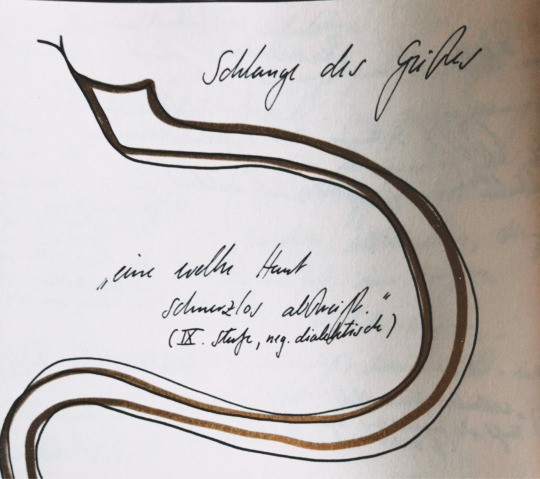
[...] The journey with Hegel just started and his dialectic is still relevant, discussed and even nowadays used by others philosophers, just to mention Slavoy Zizek, who is often emphasising the differences of Marx and Hegel, calling himself rather a Hegelian, than Marxist. The materialistic system of Marx is also not extensive and profound enough to find proper solutions, but which system and thought can be considered as flawless? There are many up-lifting points in Hegel's philosophy, I am sorry, that I can not present all those points, like... ... panlogism - hen kai pan "one and all" ; Idea of Logos, object + subject are communicating; alogical cause of world (cf. Schopenhauer), question of comprehension and comprehensibility, form of historical process = form of epistemological process, light of God + eye of the word (Weltauge) = recognisability (cf. Malebranche) ... art as the door to the absolute knowledge, healer of the impotence of nature and at the same time the business of illusions ... ethicosmic mindset found in the constant and deliberate oscillation between subject and object; Self-knowledge = World knowledge; Pan as spatial pathos of order; omnia ubique ~ "all is everywhere" (cf. Leibniz, Casanus) I would like to end with one of my favourite quotes of Hegel:
"If one begins to philosophize, one must first be a Spinozist; the soul must bathe in this ether of substance."
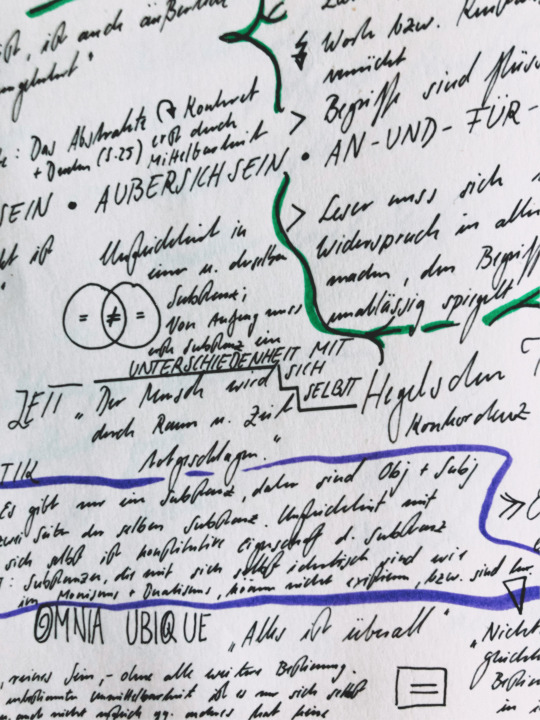
#philosophy#epistemology#ontology#dialectic thinking#dialectic method#Hegelian dialectic#georg wilhelm friedrich hegel#Hegel#antiquarian book#19th century literature#reading#Ernst Bloch#Spinoza#panlogism#pantheism#ethicosmic#theories of law
1 note
·
View note
Text
WARDI WRITTEN LANGUAGE (BASICS).

Couya's full name (properly 'Haidamane Couya') written formally and with common handwriting conventions.
The Wardi written language derives from earlier proto-language systems consisting exclusively of logograms without direct phonetic meaning or grammatical structure. These symbols gradually became simplified and abstracted to the point of many having little intrinsic clarity, and combined to communicate abstract concepts.
The development of a full written language did not occur independently (as very few written languages do), and its phonetic elements (namely its use of syllabograms) were largely derived the 'ancient' Burri writing system, gradually synthesized with native writing conventions, and in the contemporary forms a wholly distinct system. The language's Relatively universalized form is a very recent phenomena, developing within the past two centuries with the region's conquering/unification into a single entity.
The contemporary written language is a mixture of logograms and syllabograms. It is read from right to left and arranged in horizontal columns. The most formal variant of this system contains each character within a square outline, usually separated by a small space. This outline confers little phonetic or symbolic information beyond making distinction between syllables exceptionally clear, and can be (and often is) omitted in handwriting. The separation of words is conveyed through a narrow rectangle or line in formal contexts, and again often omitted in handwriting (instead indicated instead by a wider blank space).
The pure logograms that have been retained in this writing system tend to be those of very common words or specific concepts (most logogram characters for types of livestock, key crops, water, major body parts, etc are widely recognized and in common use). There has not yet been any attempts to fully 'formalize' the language and omit potentially unnecessary logograms, and they remain frequently used as shorthand while conveying the same semantic information.
Many of the syllabogram characters are directly derived from logograms that depicted monosyllabic words. For example, the spoken word 'gan' means 'cow', and the character for the syllable 'gan' is identical to the common logogram for 'cow'.
The name Gantoche (literally "cow-eye") could be written either fully with syllabograms as:

or through logograms as:

Both ultimately communicate the same meaning, but the former clarifies pronunciation (the words gan and atoche are contracted, it's gantoche and not gan-atoche).
It is a relatively easy written language to learn, as the pure syllabogram characters indicate their own pronunciation with little ambiguity and often have consistency to their construction (ie the character for the syllable 'man' contains most of the same elements as that for the syllable 'wan'- the dot placement in particular has indication of the vowel sounds).
The inclusion of logograms in general and many of the syllabic characters being directly imported From logograms complicates matters. These characters lack visual consistency, and can be confusing to the large swath of the public who know common logograms but not the full written language itself. Ie: the word 'ungande' meaning 'liver' will be composed of logogram-derived syllable characters for 'un' (which alone means 'hand') and 'gan' (which alone means 'cow'). Someone who is only semi-literate in common logograms may be confused at the meaning, especially since these same exact same characters may be used elsewhere on their own to indicate 'hand' or 'cow'.
One major exception to this tendency is that current religious doctrine requires established logogram characters describing God to be used in place of syllabic characters. The word for god is 'Od', and has its own unique character (as do each of the Faces, the capital F 'Face', and Its deified pronoun). The syllable 'od' [oʊd] is very common in the Wardi language, and a wholly separate character is used for the phonetic sound when it is not a reference to the deity (ie 'lion' (odo [oʊdoʊ]) does not contain the same character for God in spite of its first syllable having the exact same pronunciation). Names are a bit of a gray area (ie: the name 'Odabi' is very common and carries the meaning of 'gift/blessing from God'). Religious leadership is currently experiencing a mild schism on whether the written character for God is separated due to being wholly sacrosanct (and thus inappropriate to include in the written form of a personal name) or as more of a functional delineation of the sacred and mundane.
#Not 100% sure I'm using the ipa phonetic alphabet correctly but. I tried. Also typoed 'left to right' for direction for a hot minute there#Definitely chose a bit of a pain in the ass language system since there's going to be like a couple hundred possible characters (not#counting logograms) but could be worse. Also it has less total consonant sounds than english does like no V or Z and I don't#Think I've had anything with θ ð ʃ or ʒ. It does have the 'ts' sound as in 'tsetse' which I don;t think exists in english and#there's also some dental clicks. But the latter is mostly used as a filler sound or to emphasize certain words and doesn't convey#any linguistic information beyond that#I don't really intend to make this fully fleshed out I just want to be able to depict writing and have it actually mean something#Also mostly unrelated but I just found out I've been fucking up when I've referred to 'rolled Rs' in the Highlands/North Wardi dialects#The sound is a alveolar tap in most words rather than an alveolar trill (which is what 'rolled Rs' generally implies I think???)#Like I had been PRONOUNCING it all correctly at least but referring to it wrong. Brakul's name has an alveolar tap on the R#As do most of the R sounds with some exceptions#The only alveolar trill sounds in these languages typically occur with adjacent syllables that end and start with an R. Like the#name 'Korrigh' would have an alveolar trill
176 notes
·
View notes
Text
is this the first time Siobhan has done a different british accent for a d20 character? she's great at british accents and i'm realizing to my knowledge she hasn't really leaned into it here until now
#if someone knows more about british accents i'm happy to hear if i'm fully wrong about this#burrow's end sounded a mite more idk west country but i think that was more a set of mannerism choices than dialect#cloudward ho#d20#siobhan thompson
90 notes
·
View notes
Text
You know something?
I want to headcanon that Bruce has spent so much time around Alfred that he accidentally uses British insults and terminology.
For instance, he's at a gala, hes having a conversation, and the person says something so infuriating that he calls them a Pillock, and since its America, everyone just stops and looks very confused.
Dick finds this hillarious, until he starts doing it too. He'll accidentally ask someone for a 'rubber' and everyone looks horrorfied.
Tim has learnt from Dick's mistakes, he phases out the English terms, except every now and then he says a word with a very posh English accent. Mostly words he's heard Alfred say a lot, such as 'dinner', and he has to stop and resound that word until it sounds right.
Jason on the other hand, he comes back to Dick slipping all over the place, he finds it hillarious, especially as he tried to fight Nightwing, and out of nowhere he hears the word 'twat'. He can't take it seriously. He doesn't even know where Dick heard it, especially as Alfred never swears.
#batman#the batman#batman and robin#batfam#bruce wayne#dick grayson#nightwing#tim drake#red robin#jason todd#red hood#alfred pennyworth#really dumb things i think about when i should be studying#it just seems realistic that they would pick up the different dialect#totally isnt an excude for me to use my own dialect in fanfics#totally isnt payback for all the uncomfortable americanisms in my Sherlock fics 3 years ago#we love Alfred in this household#he is a cherrished butler
646 notes
·
View notes
Text

Another MS Paint doodle page and there is a Lot going on there woops
Close-ups of some of my favorites:





We have:
- Green's sona with a KtS(aWtG) snake Janus;
- 2 Basil OMORIs;
- 2 DLB!Virgils;
- 2 KtS(aWtG) Virgils and 3 more of his "pet snake", once in god form;
- A DLB!Janus;
- A DLB!Remus (dog boy!);
- LC Virgil and Janus (happy pride to these two in particular);
- and finally, DLB!Patton! :D
Dead Level Best is an AU made in collaboration with @greenninjagal-blog; the KtS(aWtG)!AU belongs to her also!
#drawing#digital#sanders sides#doodle#ms paint doodle page#dead level best#dlbasmlftepoff#ktsawtg#<- last two tags are like... weird french dialect#anxceit#janus sanders#virgil sanders#patton sanders#remus sanders#and we're good i think wooooo#cw suggestive#losing control#greenninjagal
62 notes
·
View notes
Text
studying AAVE from a linguistic standpoint has been so massively helpful not only in understanding what people are saying, but in how it applies to other languages. i would have struggled way more with habitual verbs in russian if i hadn’t had the example of the habitual “be” of AAVE to reference. i saw a tiktok of a black person learning irish in uni and he understood the habitual be in irish far faster than his peers and even helped them in learning it by showing them how habitual “be” works in AAVE. and that’s just one aspect, i could list a bunch more examples
#i think i’ve seen this film before#t#aave is NOT ‘bad grammar’ it’s a dialect with its own grammar rules and i WILL die on this hill#respect aave like you would any other dialect of english or perish#langblr#linguistics#russian langblr
60 notes
·
View notes
Text


Artemy invites Daniil to the sauna, and the joys of dialects.
translation (and a little explanation) under the cut
fi:
A: Danya, nappaa pesufati, pane kenkät jalakaan, ja pankaas menne saunaan.
D: Anteeks vittu mitä?
Eng:
A: Danya, grab the washbasin, put on your shoes, and let's go to the sauna
D: I'm sorry, fucking what?
Artemy speaks in very dialectical Finnish. Daniil speaks pretty colloquially, but without an identifiable dialect*
Artemy speaks a mix of Loimaa and Forssa dialect (this is sacrilege, and the two aren't even in the same dialect family) because I place my Finnish-au TOG around that area. I also happen to find both dialects charming. Vorssalaiset ja pesufatit, loimaalaiset ja kenkät...
*Daniil to me tries to speak standard finnish, but sometimes he slips up and some absolutely glorious Rauma dialect slips out. Why is this? Because I enjoy Rauma dialect.
#pathologic#мор. утопия#pathologic 2#my art#daniil dankovsky#artemy burakh#this is a part of my very silly modern finland au#Daniil's rauma dialect might be the wildest idea i have ever had...#“joo ku mää studeerasin lääketieret turus nii mää pruukasin pöllötel stamatinin poikkien kans jokipaateil.”#(suokaa anteeksi en ole raumalaisia)#Anyways I think that Daniil avoiding speaking in his native dialect is very much an insecurity thing#He did a few years in helsinki and got traumatized by people immediately clocking him as a junantuoma#Artemy's dialect isn't too pronounced normally#but it's always there#this case is mostly him joking around#burakhovsky
58 notes
·
View notes
Text
about to make a nonsense post. feel free to ignore this. thinkin about all the boys dialects today.
dallas' who has a strange garbled mix of southern n new York slang. whose sentences are some slidin broken melody dependin on with accent is stronger at the moment. who sounds more southern when he's tired. more city when he's pissed. whose turns of phase are often two different sayin's from opposite sides of the country squished together.
pony whose purely southern except for the odd word stolen from Dallas. whose vocabulary is a strange mix of big ass words he's only seen in books n pure hood slang. whose sentences often trip over each other. wordy n whiny.
darry whose dialect is littered with sayin's he learned from his parents. who is a strange mix of adult n child. 'fix your face' from their mom. 'goddamn' cause hes still just 20 n just someone's older brother. Who opens half his sentences with Glory n ends them with Jesus Christ. (Glory what am I gonna do with you. N get your muddy shoes off my table jesus christ)
johnny whose accent is all southern but speaks in a weird lilted turn. 'man' stolen from Dallas n 'glory' stolen from Darry. even his dialect is a hodge podge. words taken here n there. who cusses sharp n bitin in that quiet voice. who sounds like the wind n gives you all the wrong impressions he'll blow over like it.
steve n soda who speak the same language. bubblin n trippin over each other like a creek. sentences half finished. they speak their own dialouge of inside jokes n hood slang they always know first.
two whose phrases are just as likely to be pure bull straight from the crock as they are real. who makes up his own jokes. who uses words wrong n whose sentences always creep up n dissolve into laughter at the ends.
#n dont even get me started on the shepards#idk man#i just think how all the boys speak individually tells you so much about who they are#n i am never ever not thinkin about it#especially dallas#his dialect has to be such a fuckin headache#but just how he speaks reveals so much of his history#theyre just so identifiable by voice alone#aough#the outsiders#ponyboy curtis#sodapop curtis#darry curtis#dallas winston#steve randle#johnny cade#two bit mathews
71 notes
·
View notes
Text



I really love the concept of an Atsushi / Akutagawa / Kyouka trio as it was shown in Dead Apple, and I really wish it would become a thing. I think it's neat how here Kyouka's dominant color is shown being purple as balance / synthesis of blue and red. Kyouka also uses as this kind of bridge between organizations since she was a member of both at some point, and still holds a very deep understanding of how they work. I think Kyouka could really make the sskk team work as a way to find balance between these two opposites that would otherwise clash and destroy each other.
#I'm thinking of some kind of Hegelian dialectic model of thesis (Atsushi) antithesis (Akutagawa) and synthesis (Kyouka)#Although I must admit that the idea of a girl finding a peaceful compromise between two belligerent men hits a gender stereotypes nerve–#I don't really like (╥﹏╥)#atsushi nakajima#ryūnosuke akutagawa#kyōka izumi#bsd#bungou stray dogs#bsd s2#bsdrewatch2023
342 notes
·
View notes